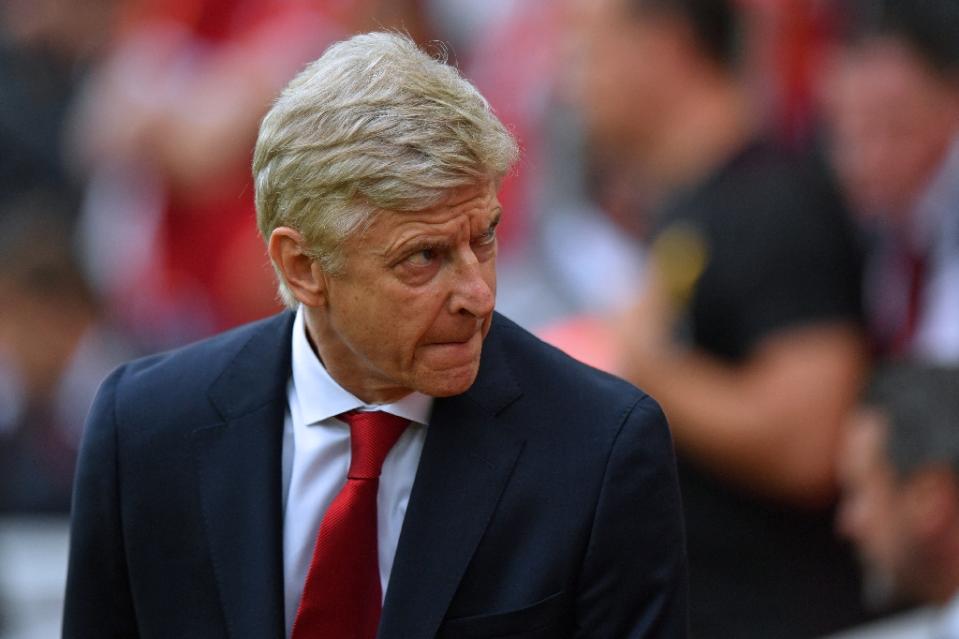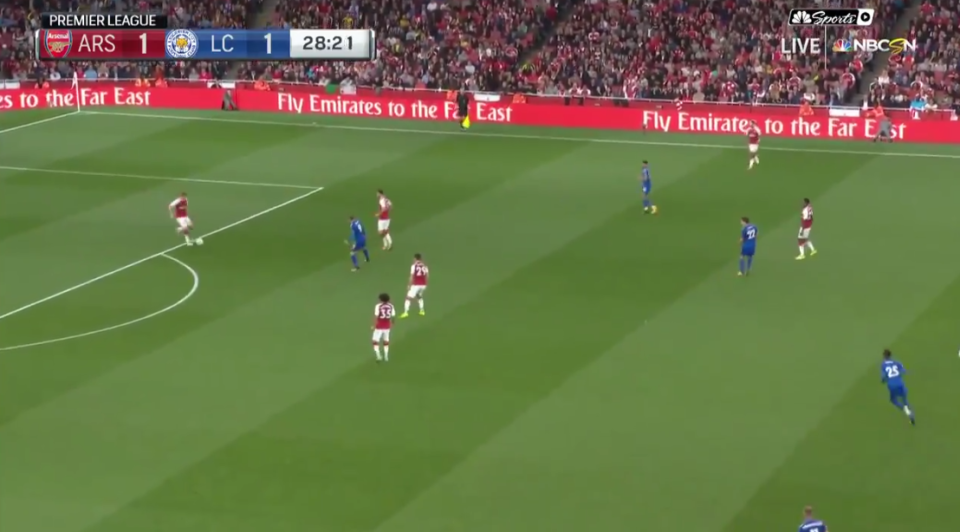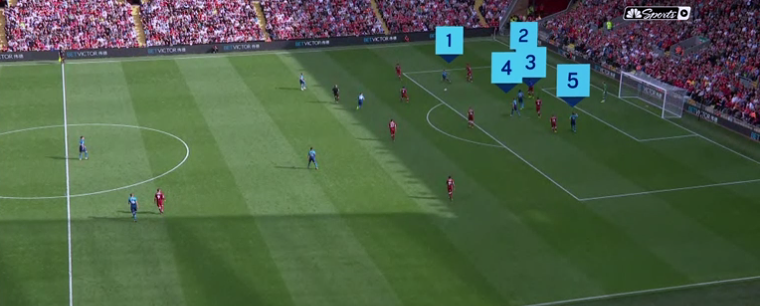2017-18 Premier League DARTS: Sifting through the Arsenal wreckage

Welcome to Premier League DARTS, FC Yahoo‘s weekly EPL column that will run every Monday morning. Why “DARTS”? Because Henry Bushnell will recap the weekend’s biggest games with Discussion, Analysis, Reactions, Takeaways and Superlatives. All of that is below. But first, a brief intro …
It is as much an annual tradition as Christmas Day, as Boxing Day football in England, as any customary cultural event that has been wedged into the rhythm of human life. In Germany, they have Oktoberfest. In Pamplona, San Fermin. In Rio, Carnival. And in North London?
In North London, they have the Arsenal Meltdown.
It invariably occurs following an embarrassing performance that sends f-bombs flying on Arsenal Fan TV, #WengerOut campaigns hurtling into overdrive, and guilt-tinged joy coursing through non-Arsenal fans around the globe. There is no rigid, defined pattern to it. Instead, each year, the tradition evolves. It is both laughable and exasperating, depending on point of view. And of course, it sparks contentious debate.
The Arsenal Meltdown blindsided the Premier League on Sunday afternoon. It arrived not completely unannounced, but with an off-putting ferocity that prompted one club legend to claim Sunday’s 4-0 defeat at Liverpool was the worst Arsenal loss he’d ever witnessed.
Hyperbolic statements are far from a foreign concept at Arsenal. They often arise in the wake of the Meltdown, often intend to exaggerate the depth of the crisis at hand, and often serve to inject big-picture pessimism into a fan base already plagued by plenty of it.
In that sense, they are unjustified, ignoble and deceiving. No single defeat spells disaster. Such statements, therefore, are overreactions in their purest form.
But it’s not the statements themselves that best portray the state of affairs at Arsenal; it is their reoccurring nature. It’s not the intensity of Sunday’s disappointment that tells of the club’s plight; it is the inevitability of it.
At what point do such overreactions overlap with logic simply because they become so frequent?
Arsenal has recovered from calamitous defeats in the past, and it will recover from this one. But if the recoveries consistently land the club back at square one, with another recovery necessary, what is the point? What is the club’s direction?
Arsenal has had its highs over the past decade, and it has had its lows. The lows provoke the Meltdowns. The highs offset them, and keep Arsene Wenger around. And somehow, without fail, the highs still spark optimism.
But it has become increasingly clear that the equilibrium in between the two simply isn’t good enough. Wenger’s Arsenal frankly isn’t good enough. That is not an overreaction. It’s a rational opinion based on the debris of years of overreactions, and with every Arsenal Mentdown, it becomes more and more inarguable.
Consider that as you measure your takeaways from the annihilation at Anfield. And consider it as we pick our way through the rubble – and through what actually went wrong for the Gunners.
1. Liverpool’s first, and Arsenal’s unpreparedness
Last week, the open to this column was an abbreviated ode to Antonio Conte, who tactically and psychologically prepared a depleted Chelsea squad to march into Wembley and rip three points away from Tottenham. It was a textbook approach to a top-six clash. The Blues were organized and alert.
They were everything Wenger’s Arsenal wasn’t a week later.
Wenger seemingly had no nuanced plan. He ushered his side onto the Anfield pitch without apparent regard for the shortcomings of his players, without regard for the holes in his 3-4-2-1, and without regard for Liverpool’s thrashing of a similar formation midweek. He tossed those players to the wolves, and their lack of mental preparedness was so acutely obvious.
It was as apparent as ever on Liverpool’s opening goal. Petr Cech raced to play a quick free kick out of the back, but the vast majority of Arsenal players weren’t privy to the plan. Two of them were talking to each other, or to a coach, 50 yards away. That’s both hilarious and embarrassing.
It’s unclear exactly where fault lies here. Cech can’t just opt to restart play quickly if his team is disconnected and ill-equipped to keep possession. But if Wenger had instructed the team to play quick free kicks, blame lies elsewhere.
Either way, Arsenal’s 11 were not on the same page. Granit Xhaka only had two mediocre passing options when he received the ball, and chose terribly between them. But the overarching issue is that he was under pressure from an attentive and hungry Liverpool player while his teammates were asleep. The goal was a suitable punishment for Arsenal’s inadequate approach to the game.
2. Liverpool’s second, and Wenger’s selection dilemmas in midfield
Wenger has gone years without a world-class central midfielder at Arsenal, and his teams have suffered as a result. Spacing issues and defensive fragility have haunted the Gunners time and time again. Some portion of those issues stem from the training ground. But the biggest problem at present is that Wenger simply doesn’t have players who won’t be exposed on one side of the ball or the other.
In the first game of the season against Leicester, he paired Xhaka – undoubtedly the best of the bunch, despite the flak he takes – with Mohamed Elneny, a proper (and properly average) defensive midfielder who does not belong in an Arsenal starting lineup. He also doesn’t belong next to Xhaka in a midfield two. That pairing flubbed its spacing on multiple occasions, and gifted Leicester a goal:
Jamie Vardy gets on the score sheet in #ARSLEI!
Watch on NBCSN or stream here: https://t.co/fF1y24ZUx2 pic.twitter.com/s7BZsMs63a
— NBCSN (@NBCSN) August 11, 2017
I mean, look at this:

Wenger’s solution was to insert Ramsey into his starting lineup in place of Elneny against both Stoke and Liverpool. Liverpool’s second goal showed precisely why that pairing doesn’t work either. Ramsey’s lack of positional discipline – not necessarily a flaw, just a trait – left Xhaka outnumbered …

… and Arsenal exposed on the counter:
The Ramsey-Xhaka duo especially doesn’t work against a worthy opponent, which is why it’s puzzling that Wenger would select a defensive-minded player for a home match against a mid-table foe but opt for Ramsey away from home against a superior one. The problem, however, is the broader one: Wenger hasn’t found an effective enough two-way midfielder in the transfer market, and he’s failed to adequately develop the ones he does have.
3. Cesc Fabregas, and a goal that wove together an entire career
While Arsenal was getting thrashed in the Northwest, one of its former stars was pulling midfield strings back in London. Cesc Fabregas might have a crucial role to play for Chelsea against the bottom half of the league this season, and he started and ended the move that unlocked Everton.
Fabregas’ career arc has been fascinating. He excelled as a box-to-box midfielder in his early 20s at the Emirates. He was primarily an advanced creator in a midfield three when he moved to Barcelona in 2011. Meanwhile, with the Spanish national team at Euro 2012, he was employed as a false nine. Now, with Chelsea, he’s the deep-lying playmaker.
In a way, the goal encapsulated all four iterations. The through-ball into the channel was Chelsea Cesc. The burst into space at the top of the box was Arsenal Cesc. The one-two with Alvaro Morata was Barcelona Cesc. The tidy finish was La Roja Cesc. It was 1-0 to Chelsea, and it was 13 years packaged into 10 match-winning seconds.
4. David Silva, and his passing wizardry
No hard-hitting analysis here. Just a decree to marvel at David Silva, probably the Premier League’s best passer. It’s either him or Fabregas.
Nothing flashy. Nothing unusual. But watch the way Silva sees the play develop. He shifts the ball onto his left foot when his mind first conceives of the pass. He creates a slightly better angle to sneak the ball in between Bournemouth center backs. And then the weight of the pass is perfect. Just perfect. That’s such a difficult ball to play, and it’s executed by one of the few players in the EPL who can play it.
5. Raheem Sterling, and the complexity of his sending off
Gabriel Jesus’ goal was certainly the prettier of City’s two, but Raheem Sterling’s 97th-minute winner was undoubtedly the most dramatic. It was also the most chaotic, in part because of what transpired afterward.
Sterling zoomed toward the City fans housed in the near corner of the ground, and as he flung himself into them, the line between stands and pitch blurred. A small patch of sideline became a mosh pit of sky blue-clad players, their supporters, policemen and stewards. A minute later, a couple of fans had been arrested, Sterling had been sent off, City had won, and controversy reigned.
Referee Mike Dean brandished a second yellow to Sterling for inciting the wild celebrations and was lambasted for the decision in the game’s aftermath. The criticism came from everywhere – from fans, from pundits, and even from Pep Guardiola: “If you cannot celebrate with the fans, the best solution is not to invite the fans,” Guardiola said. “I don’t understand, maybe someone can call me to explain.”
Here’s your explanation, Pep: There is nothing inherently wrong with what Sterling did. But it’s a bookable offense because it encourages fans to encroach on the pitch. And although the encroachment is all well-intentioned, it’s a slippery slope, especially when alcohol is almost surely involved. What if a Bournemouth player had been over by that corner as well? What if the pandemonium spread from that corner and actually spilled out onto the playing field?
Allowing fans to find their ways onto the field sets a dangerous precedent. That’s how trouble starts. It’s how it used to start in England before authorities took measures to stamp it out, and it’s how trouble still starts at soccer matches elsewhere in Europe and around the world. That’s why fans are punished for their actions, and it’s why Sterling was shown a second yellow. He didn’t do anything wrong. But the yellow targets the first link in a chain reaction, and is part of a larger initiative to corral the passion of supporters and prevent good-natured fandom from getting out of hand.
6. Dean, and misunderstandings of added time
After Sterling’s winner, Bournemouth was understandably peeved. One of the common complaints was explicated by Charlie Daniels: “There was only five minutes of added on time, so ask the referee why we played seven,” he complained.
But if you did saunter up to Dean after the match to pose the question, he’d give you a satisfactory explanation. And not only that, he’d also be spot-on.
The fourth official’s board indeed called for five minutes of added time. But to be clear, the number on the board is the required minimum. Why? Because of games like Saturday’s. From the time the clock struck 90:00 to the time it hit 95:00, there were 3 minutes and 15 seconds of prolonged stoppages. First, Dean took 1:05 to quell a managerial dispute on the touchline. Then Bournemouth took 28 seconds to take a goal kick – something Guardiola had been bemoaning all afternoon. And less than a minute later, play was halted for 1:42 so that Bournemouth striker Benik Afobe could receive medical treatment.
All things considered, play should have lasted until at least 97:00, and probably 98:00. Sterling’s goal occurred at 96:33. If anything, the home side actually should have had more time to go in search of an equalizer after the Sterling madness.
But we won’t get picky. Good on Dean for doing what many referees frustratingly fail to do. Outside of eliminating the running clock, adding to added time is the simplest way to curb time-wasting. It’s maddening that a significant number of refs ignore that option.
7. Arsenal Fan Rant 1: Screaming at TV edition
Warning: Explicit language ahead.
Other warning: Arsenal schadenfreude ahead.
Expired wasteman…. pic.twitter.com/wpmeiwdSdk
— Djspecsgonzalez (@djspecsgonzalez) August 27, 2017
8. Arsenal Fan Rant 2: Screaming into camera edition
Warning: Explicit language. Again. A lot of it. But also a lot of good stuff from the venerable @hughwizzy.
9. Arsenal Fan Rant 3: Screaming into microphone edition
This one doesn’t have explicit language! …
… But the rest of Arsenal Fan TV’s post-match videos? Uh, you can have a look and a listen for yourself.
10. Re-calibrating our projected table three weeks in
The absurdly timed international break means DARTS have a week off. But before we dive into World Cup qualification, it’s a decent time to assess where the Premier League landscape after three weeks.
In fact, we might make this a monthly exercise. Everyone made their preseason predictions. I made mine. But what would a projected table look like if those predictions were made today? Weighing everything we know, here are the adjustments I’d make:
1. Manchester City (-)
2. Manchester United (-)
3. Tottenham (-)
4. Chelsea (-)
5. Liverpool (-)
6. Arsenal (-)
7. Southampton (-)
8. Everton (-)
9. Leicester (+3)
10. Stoke (+1)
11. Watford (+5)
12. West Brom (+2)
13. Newcastle (-)
14. West Ham (-5)
15. Huddersfield (+5)
16. Crystal Palace (-6)
17. Bournemouth (-2)
18. Burnley (+1)
19. Swansea (-1)
20. Brighton (-3)
– – – – – – –
Henry Bushnell covers soccer – the U.S. national teams, the Premier League, and much, much more – for FC Yahoo and Yahoo Sports. Have a tip? Question? Comment? Email him at henrydbushnell@gmail.com or follow him on Twitter @HenryBushnell.



